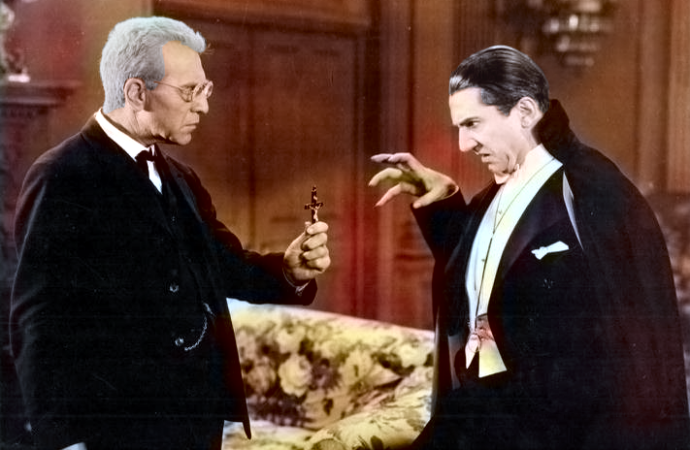Bram Stoker’s Dracula again reminded me: Real men must give their blood.
For most, Dracula is a novel about horror. And yes, there are horrifying elements in the book. After all, Dracula is a blood-sucking fiend who stalks his victims, instilling into them a paralyzing fear-like poison that condemns them to a fate worse than death.
But beneath the thrills, which tend to draw all the attention and applause, are some serious reflections about masculinity. Dracula is more than just a monster plucked from the peripheries of folklore and thrust into the winding streets of Victorian London. He is, at base, an embodiment of the anti-man—the opposite of what a masculine man should be. He is an inversion, an absence, and a lack. Indeed, he hardly appears in his own book, though his absence saturates the pages with dread and foreboding. He casts no shadow, for he has not the substance of a man.
Dracula’s anti-masculinity is highlighted through its juxtaposition with the courage and self-sacrifice of the other men in the story: Jonathan Harker, Dr. Seward, Arthur Holmwood, Quincy Morris, and Dr. van Helsing. Though Stoker doesn’t sketch these men with a great deal of depth or complexity, these characters provide instances of good-old-fashioned manly decency. These are regular blokes—typical Victorian gentlemen who were not great travelers, warriors, or adventurers. Yet 1897 Victorian society had a strong enough concept of decency, courtesy, and manliness to produce unassuming, unremarkable men on whom we can count to do the right thing.
As Dracula preys on women and children, these men seek to defend them. As Dracula thinks only of himself, these men think only of others. As Dracula creeps night after night into Lucy Westenra’s bedroom to feast on her blood, these men repeatedly give transfusions of their own blood to keep her alive. And they do it willingly. Dr. Seward reflects, “No man knows, till he experiences it, what it is to feel his own life-blood drawn away into the veins of the woman he loves.” And Van Helsing offers a comment that is true both literally and figuratively: “A brave man’s blood is the best thing on this earth when a woman’s in trouble.”
Dracula is, of course, a melodrama. Its images are exaggerated, its colors oversaturated, and its strokes lack subtlety. But Stoker, perhaps, identifies better than other writers what the myth of the vampire really represents (selfishness) and what the antidote to vampirism really is (selflessness).
The weak man, like the vampire, is a leech on society, emerging from basement hideouts to suck out resources, money, and pleasure from other people. Rather than building up society and giving his blood—at least figuratively—that it may flourish, the weak man progressively tears it down. He does not produce; he only consumes, feeding off of the hard work of others. From women, he seeks to draw pleasure without bringing about life. He steals from the woman her life or (at least) the life she could have imparted to her children.
On the other hand, real men give. While most don’t give literal transfusions of blood to their wives, their life-blood—in one sense—is drawn away by family life. At least in their better moments, good men give blood, tears, and sweat. They work day after day in mostly inglorious labor to support their family. They bear the heat of the sun or the rage of a difficult boss. As Shakespeare puts it:
Thy husband is . . . one that cares for thee,
And for thy maintenance commits his body
To painful labour both by sea and land,
To watch the night in storms, the day in cold.
And in this labor, a man’s best years—the years of the most vitality—fade away. I think most family men are a little surprised to wake up old, realizing their former energy has lapsed. They see themselves in the mirror, and they shake their heads. But not without a smile.
What is this smile for? Every family man (and woman), worn out though he may be, knows that not one drop of life-blood was wasted. The old man sees his children and his children’s children flourishing, and he knows, in his tired heart, that it was worth it.
When Seward says, “No man knows, till he experiences it, what it is to feel his own life-blood drawn away into the veins of the woman [and, we might add, children] he loves,” he’s not saying it with regret or as a complaint. He’s saying it with joy.
—
Image credit: Public domain
6 comments















6 Comments
Chris Hughes
October 10, 2023, 4:04 pmVery well said. Thank you
REPLYTionico@Chris Hughes
October 10, 2023, 5:59 pmAnd few men comprehend this, even far fewer actually live by this standard. I am most blessed beause I have been given a few dozen friends who DO understand and live this model, and who encourage and ofen equip others to do so as well.
REPLYCarolina
October 10, 2023, 6:35 pmThis brought tears to my eyes
REPLYI went and hugged my husband and thanked him
Deanna Grimm
October 10, 2023, 6:42 pmExcellent and true. Thank you.
REPLYJacqui
October 11, 2023, 6:26 amOh Bravo!!
REPLYStephen Travis
October 12, 2023, 8:17 amGreat analysis! The irony of ironies is that the REAL "Dracula," Vlad III Dracul, WAS a man's man and a Christian, who gave his own blood, fighting for freedom, matching cruelty for cruelty that he learned from his Muslim opponents, against the world's most powerful, cruel, and truly evil empire: the 15th Century Ottomans. The Venetian's despised him and used the newly invented printing press to distribute ad hominem propaganda that claimed he drank blood (and even semen,) and, with the publication of the fictional, 19th century Stoker novella, his real story of self-sacrifice for his people has been all but lost to history.
REPLY